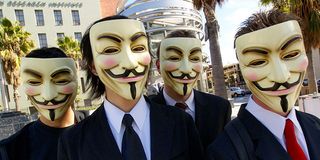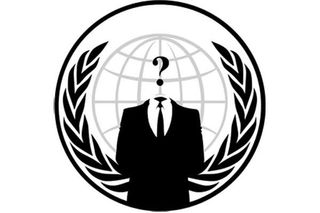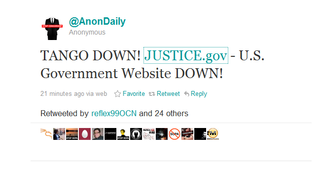Best Hacks by the Hacktivist Group 'Anonymous'
Intro

"Hacktivism" is a modern form of protest in which savvy programmers use their hacking skills to fight back against social and political injustice. Though nonviolent, most acts of hacktivism are illegal, or at least legally ambiguous, leading most perpetrators to act anonymously. Nonetheless, in a day and age when many people feel that justice is not guaranteed by the laws of the land, some view these hacktivists as heroic vigilantes who use their tech wizardry to defend the public good.
In recent years, a loosely-organized group of hacktivists called "Anonymous," whose members attend demonstrations wearing signature Guy Fawkes masks, has pulled off a series of especially infamous hacks. Here are a few highlights.
Church attack

{youtube JCbKv9yiLiQ}
The group gained international notoriety in 2008 for a months-long campaign against the Church of Scientology called "Project Chanology." The hackers crashed the church's websites and flooded their fax machines with black faxes (which use up printer ink), as well as coordinating a method of attack called "Google bombing," where the word "scientology" is linked to other terms such as "dangerous" and "cult," so that Googling "scientology" would produce skewed search results.
Project Chanology was Anonymous' response to what it said was an effort by Scientologists to use Internet censorship to spread misinformation about their practices. For example, the church had recently sued YouTube for copyright violations after one of its propaganda videos was leaked and posted to the site. The video showed Hollywood actor Tom Cruise, a high-profile Scientologist, extolling the virtues of the church in a way that many commentators said seemed brain-washed and delusional. [7 Quite Unholy Church Scandals ]
Anonymous responded to the lawsuit against YouTube by posting the above video, a call-to-action against Scientology that has since been viewed 4.6 million times.
Dark discovery

In October, Anonymous gained attention and praise for taking down more than 40 illegal child pornography websites. Members of the group discovered a cache of the sites on Oct. 14 while browsing a secret website called the Hidden Wiki, a guide to hundreds of underground websites that are invisible to search engines. The hackers specifically targeted Lolita City, a file-sharing site used by pedophiles, and leaked the names of the site's 1,589 active members to the public on Oct. 18.
Not only did this hacking campaign, called "Operation Darknet," go where law enforcement agencies had been unable to go, it also exposed a very dark side of the Internet. The "darknet," as it's called, is not just hard to reach for regular users, it is actually deliberately concealed through data encryption. [More about Operation Darknet]
BART bash

On Aug. 11, the San Francisco Bay Area Rapid Transit system (BART) shut down subterranean cellular phone service, stifling protests that had been set to take place on its train platforms that day. Demonstrators had planned to stop trains from running in response to the fatal shooting of an unarmed passenger by the BART police one month earlier, but without the ability to coordinate their efforts via cellphones, the acts of civil disobedience never crystallized. [How BART Killed Cell Phone Service ]
BART's censorship met with an immediate media hailstorm, and Anonymous swiftly responded with a series of attacks. First, they cracked into the user database of BART's consumer-outreach website, MyBART.org, and posted the names, email addresses, ZIP codes and account passwords of thousands of MyBART.org users, along with a manifesto explaining that BART had violated the peoples' right to assemble. Later, hackers broke into a website belonging to the BART police department and posted the names and addresses of dozens of BART officers. They also organized a series of protests on BART train platforms in the weeks that followed.
Lastly, when BART refused demands that its spokesman, Linton Johnson who refused to admit that interrupting cellphone service had been a mistake Anonymous posted nude photos of him online.
'Cybergate'

In February, Aaron Barr, CEO of the cybersecurity firm HBGary Federal, announced that his firm had successfully infiltrated the Anonymous group and planned to unveil information about its members at an upcoming conference. Anonymous fought back and won.
First, hackers hacked HBGary Federal's website and replaced the homepage with their logo and a message stating that Anonymous should not be messed with. Using a variety of techniques, they then took down the company's phone system and extracted 70,000 messages from its email system. They created a searchable database of these emails on the Web, and posted a link to them from Barr's Twitter account, which they also hacked into.
The emails revealed some extremely incriminating information about the company, including its plan to cripple the whistleblower organization Wikileaks through cyberattacks and a public campaign of disinformation. What's more, Barr's leaked emails revealed that Hunton & Williams, the law firm that organized the anti-Wikileaks campaign and that also works for the U.S. Chamber of Commerce actually contracted the security firm (along with two others) to have them target political organizations critical of the chamber.
The hack ultimately led to a government investigation of many of the companies involved in the scandal , as well as Aaron Barr's resignation.
Arab Spring

Anonymous has played an ongoing role in the Arab uprisings over the past year. The group has orchestrated a series of illegal "denial of service" attacks against the websites of the governments of Egypt , Tunisia and Iran. These are attacks that use simple software to overwhelm a website with high volumes of traffic, crashing it.
The hackers also released the email addresses and passwords of Middle Eastern governmental officials who opposed the Arab Spring protests, including officials from Bahrain, Egypt, Jordan, and Morocco.
In early August, Anonymous hacked the Syrian Defense Ministry website and replaced it with an image of the pre-Ba'athist flag, the symbol of the pro-democracy movement happening in the country, and a message supporting the Syrian uprising and calling on soldiers in the Syrian Army to defect to protect protesters.
Federal takedown

On Jan. 19, the F.B.I. shut down MegaUpload, a company that operates file hosting services on websites such as MegaVideo, for copyright infringement. Several of the company's top employees were arrested. In a same-day retaliation, Anonymous quickly disabled the DoJ website, as well as taking down the websites of the Recording Industry of America (RIAA) and the Motion Picture Association of America (MPAA), two of the most powerful media lobbies in Washington.
Sign up for the Live Science daily newsletter now
Get the world’s most fascinating discoveries delivered straight to your inbox.
Natalie Wolchover was a staff writer for Live Science from 2010 to 2012 and is currently a senior physics writer and editor for Quanta Magazine. She holds a bachelor's degree in physics from Tufts University and has studied physics at the University of California, Berkeley. Along with the staff of Quanta, Wolchover won the 2022 Pulitzer Prize for explanatory writing for her work on the building of the James Webb Space Telescope. Her work has also appeared in the The Best American Science and Nature Writing and The Best Writing on Mathematics, Nature, The New Yorker and Popular Science. She was the 2016 winner of the Evert Clark/Seth Payne Award, an annual prize for young science journalists, as well as the winner of the 2017 Science Communication Award for the American Institute of Physics.













